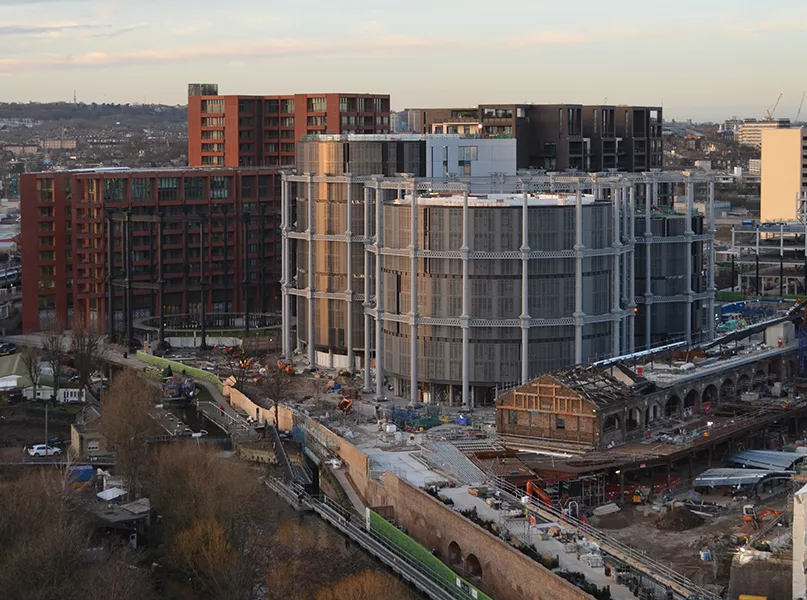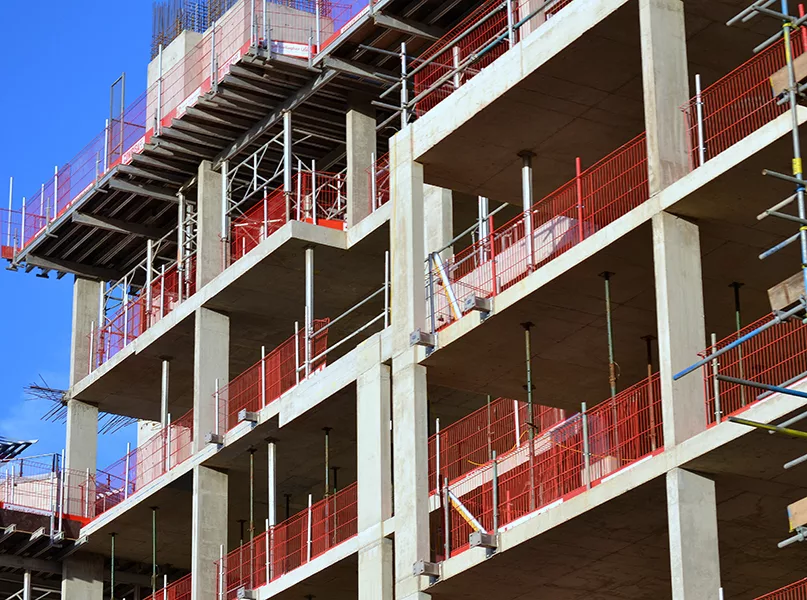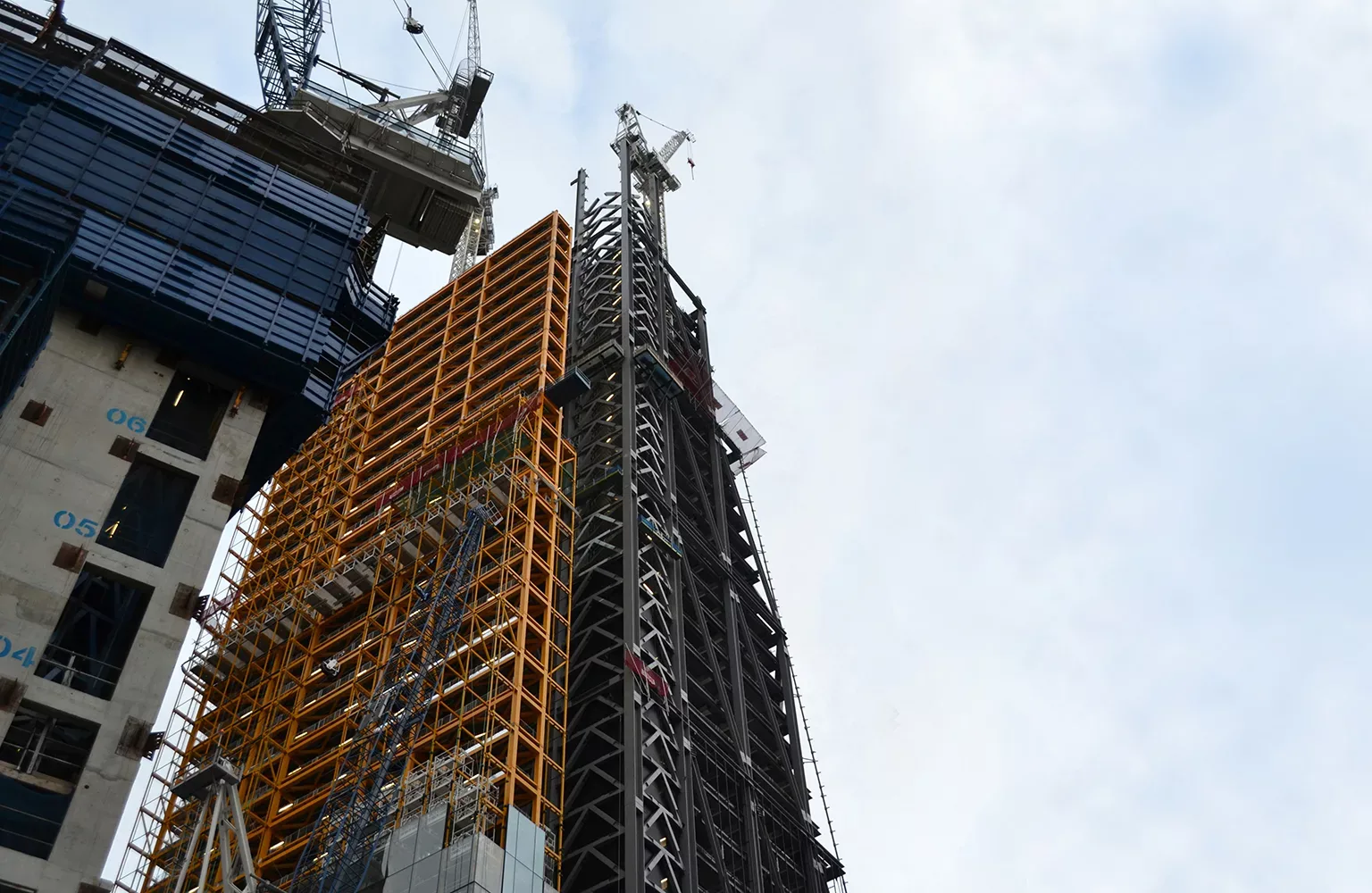As European countries continue to prioritise energy efficiency, sustainability, and technological integration in building projects, the UK construction sector has been compelled to adapt to these evolving trends to remain competitive.
BRITISH CONSTRUCTION INDUSTRY SPOTLIGHT
Overall productivity in British construction remains below the UK average compared with other industries and has experienced little change in the past 50 years. As a result, the government has repeatedly tried to improve the sector’s efficiency, all while having to contend with a plethora of difficult circumstances in recent years.
The construction industry was pushed into a period of turmoil following the Brexit vote in June 2016, with fears of post-Brexit EU labour shortages being cited as a key reason for the vast uncertainty that subsequently engulfed the construction landscape.
Further disruption followed during the COVID-19 pandemic from 2020 onwards, and the sector has also had to contend with inflationary pressures as a consequence of rising fuel prices following the 2022 Russian invasion of Ukraine.
In 2023, the construction industry accounted for 11 percent of UK company insolvencies as numerous businesses were affected by rising inflation and interest rates.
Q&A WITH THE CONSTRUCTION INDUSTRY COUNCIL
The Construction Industry Council uses expertise to shape a built environment that delivers a better world by bringing professionals together through a collective interest in enhancing the industry to have a greater positive impact and contribution to society. Graham Watts OBE, CEO, tells us more
The Construction Industry Council (CIC) is the representative forum for the professional bodies, research organisations, and specialist business associations in the British construction industry.
Graham Watts, CEO, has been involved with CIC since 1989. Initially joining as a member of the council, he subsequently was part of the Executive Board, before becoming Director. He was then appointed Chief Executive and Secretary in October 1991.
Prior to joining CIC, Watts was Chief Executive of the Chartered Institute of Architectural Technologists (CIAT), which has been a member of CIC since 1988. Today, he is responsible for the general policy and direction of CIC and for maintaining effective communication with the government and other external agencies, as well as establishing and maintaining the CIC office.
Firstly, could you talk us through the origins of CIC – when was it founded, and what was its initial vision?
Graham Watts, CEO (GW): The construction industry and the built environment professions are very fragmented. There are at least 250 organisations in the construction industry, including trade associations, professional bodies, and more, and it never really had a unified voice before CIC was formed.
The council was originally established as the Building Industry Council in 1988, after several attempts to bring the industry together and provide a single voice for professionals in all sectors of the built environment. It’s 36 member organisations give CIC a collective membership of 500,000 professionals.
It also provides an interface for members in the wider industry and government. It supports the Strategic Forum for Construction, Construction Skills Certification Scheme (CSCS), and the Construction Umbrella Bodies Limited and its subsidiary initiatives, and works with the government through the Construction Sector Unit of BEIS, the Building Regulations and Standards Division of MHCLG, the Green Construction Board, Infrastructure and Projects Authority, and the All Party Parliamentary Group for Excellence in the Built Environment.
We offer a range of professional services, including dispute resolution, policy development, maintenance and operation of the Approved Inspectors Register (CICAIR), the provision of a Design Quality Indicator (DQI), and so on.
We’ve always had a very close relationship with the umbrella bodies of the trade organisations, and we work collectively with them for the betterment of society and the entire industry.
“We’ve always had a very close relationship with the umbrella bodies of the trade organisations, and we work collectively with them for the betterment of society and the entire industry”
Graham Watts, CEO, The Construction Industry Council

Are there any key investments or recent projects you’re working on that you’d like to pay special mention to?
GW: There’s a lot of things we are doing that I think are going to help the industry in the long run. For example, a health and safety course that we’ve developed is designed specifically for professionals, the people who are responsible for starting projects in terms of design and management, whether it’s from a brownfield site or an existing construction site.
The current courses that exist for health and safety professionals are exclusively aimed at people who are permanently based on-site. In this way, we’ve tapped into something that doesn’t exist and it’s a really important course that will help improve health and safety across the industry as a whole.
We’ve also introduced an inclusive environment scheme that builds on work started for the London 2012 Olympics in creating accessible environments. As a legacy from the Olympics, we integrated the work in association with government departments and developed a series of essential principles that were a guide for consultants, asset managers, and building owners on how to make their properties more accessible.
We are recognising employers that are creating buildings that their staff and visitors can enjoy, whatever their circumstances. So, if they are in a wheelchair, deaf or blind, the buildings take into account their specific needs and be transformed into inclusive spaces.
We’re also very concerned and occupied with improving building safety. As such, the Competence Steering Group (CSG) which was set up under the auspices of the Industry Response Group, established jointly in the immediate aftermath of the Grenfell Tower fire in June 2017 by the (then) Ministry of Housing, Communities and Local Government, Build UK, CIC, the Construction Products Association (CPA), and the National Fire Chiefs’ Council (NFCC).
The CSG brings together hundreds of organisations across the industry to improve the competence of the people working on higher-risk buildings, ranging from engineers, architects, and building designers to the installers of equipment on higher-rise buildings, the fire risk assessors, and even fire and rescue services.
This is going to have a massive impact on the industry going forward because it means everybody has got to qualify in a way that takes into account fire and structural safety on complex buildings in a way that was never in existence before the Grenfell Tower tragedy. So that’s something I’m particularly proud of.
CIC STRATEGIC OBJECTIVES
• Interface with professional bodies to promote quality, cohesion, and societal good (embracing the development of skills and talent).
• Climate change /environmental sustainability.
• Equality, diversity, and inclusion, embracing productivity.
• Well-being in its broadest sense, embracing health and safety and building safety.
• To add value and emphasis to the work of members.

How do you see the organisation developing over the next five years?
GW: I think we’ll continue to move more towards the natural environment as well as the built environment. Our other priorities for the next two years are geared towards nature-based solutions.
We have a very active climate change committee, which has 10 separate work streams for the role of the built environment professionals who are helping to deliver net zero. Again, we work very closely with the Construction Leadership Council (CLC) on a series of carbon net zero policies, and that’s a major priority for CIC going forward.
We aim to bring organisations together and we’ve done that very successfully amongst the construction professions, but I think we’ll continue to build on this moving forward into a wider base of organisations.
Since its inception, how has the council developed and progressed in terms of overcoming adversity?
GW: In a counterintuitive sense, the COVID-19 pandemic helped the construction industry in terms of integration. At the beginning of the crisis, there were lots of calls for construction work to stop because people thought that workers travelling to sites would increase the spread of the virus.
In response to this, CIC and CLC called together all the disparate elements of the industry, including the bodies representing contractors, manufacturers, civic builders, and merchants, alongside the government, represented through various departments such as the Cabinet Office, Department of Business and Trade, Department of Housing. It was great to see everyone pull together as a collective. This collective met every day for an extended period and still meets every week.

What specific targets do you hope to achieve moving forward?
GW: The main priority for us is to ensure that our Members remain with us and we work together collectively for the good of the industry and society as a whole.
We recently developed a corporate affiliate scheme where companies can share the information, guidance, and everything else CIC produces. We also have some targets going forward about the number of companies we can attract for the scheme.
CIC aims to break free from being the best-kept secret in the industry and share our work on risk, liability, and other essential guidance. At present, many people in construction spend an awful lot of money on legal fees before finding out that this is guidance CIC already provides at no cost.
We’ve grown from five professional bodies to 36, comprising the majority of the built environment sector. Additionally, we’ve experienced a gradual movement from being purely a construction body to an association that spans the whole of the built environment, now taking into account issues such as landscape and natural environment planning.
Moreover, we are proud of the role that we’ve played in helping to integrate the broader industry through bodies like CLC.
Another aspect that people don’t relate to CIC is that we own a significant amount of other vehicles used within the industry. For instance, if you walk up and down the streets anywhere in the UK, you often see a banner that says, ‘we are a considerate constructor’; this is a constructors scheme that CIC took ownership of in the 1990s, alongside the Construction Products Association (CPA) and it’s now run as a completely separate subsidiary.
CONSTRUCTION INDUSTRY COUNCIL PARTNER






























